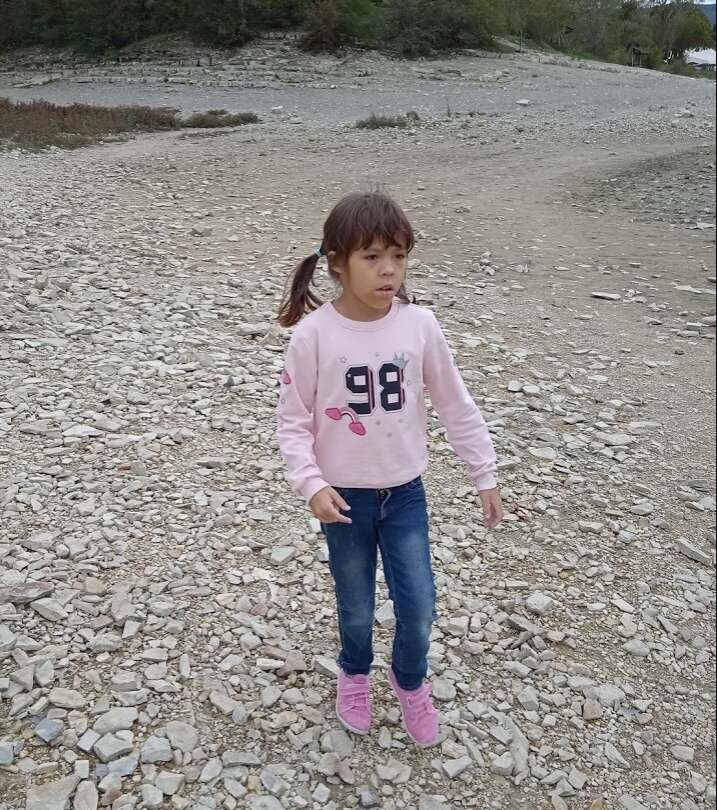Communication of an autistic child with other children. Our experience.

Summer is hot in the south and I’m not just talking about the weather right now. With the advent of the holiday season, our apartment (and now the house) is filled with numerous friends, relatives, and sometimes relatives of relatives. All this noisy company is changing the usual way of life. The regime is changing, we are compacting, we used to give the bedroom to the guests, and we ourselves moved to the children’s rooms, now it’s easier, after all, it’s not for nothing that we made the guest room. Most often, all our guests come with children. Today I want to talk about how Alice builds relationships with the children of our guests.
For several years she has been fascinated by small children. She always looks curiously into the stroller, looks at the kids for a long time, watches them play. What is surprising is that if a child of her age interferes with her on the playground, for example, blocked the exit on the slide, then she can calmly move it. At first, of course, she will wait for the passage to be freed by itself, then she usually points with her hand, saying to move to the side and if there is no understanding here, then she will try to squeeze through or move her hand. She has some kind of special awe for small children, she is afraid to touch them. If it interacts, then very carefully. Rather, she will avoid physical contact. In such cases, she can even tolerate the fact that the child will scream or take her toys. If, for example, Alice’s peer screams (this happened in kindergarten, the group was a special child, the children were very different and I wrote about it here), then she first leaves, closes her ears, if the screaming does not stop, then she can come up and close the child’s mouth with her palm, they say, do not scream. With small children, she does not allow herself to do this, she leaves by herself, covers her ears or turns to me so that I somehow influence the child and stop his crying.
With their peers (+/- I would indicate the age from 4 to 11 years) she can interact if they are included in her activities. For example, she may well collect a puzzle or a domino together with another child. She can easily treat, serve something, bring it if you ask her. She does not show initiative in communication, but responds to someone else’s initiative. Most often, of course, she is not interested in those around her age. There was an interesting case when we had a niece who was a year younger than Alice. During a trip to the Crimea, Ruslan (our eldest son, he is 18) began to tease his niece and Alice, who was sitting next to her, stood up for her, hit him on the arm and began to take his hands away from her. And somehow in a special way she had not treated her niece before.
Usually the most difficult are the first few days after the arrival of guests. Alice gets used to a certain regime and lifestyle, and when it changes, she needs time to get used to it. The people who come to us are very positive, Alice is treated well, many have known her for a long time, so there are no conflicts.
The easiest way is with children who are older than 12. Probably because the daughter got used to the fact that she has an older brother, and friends also came to him, that is, older children fit perfectly into her picture of the world. With such children, she easily makes contact, can ask for help herself, easily tolerates bodily contact if, for example, she is tickled. And it’s also easier for older children to explain that Alice is not like ordinary children and how you can interact with her. Preschoolers often try to build a relationship with her according to the usual scenario, ask what her name is, how old she is, etc. and they are very surprised when they hear that she communicates differently, that she does not know how to speak yet. On the other hand, they react quite calmly and kindly to explanations of why Alice does not speak, they are more curious than scared. And, if, in simple words, to tell about the features of Alice, they perceive it as a variant of the norm and continue to communicate with her. In my memory, we had only one case when the child did not want to communicate with Alice, saying that she was stupid. Here, rather, it was the fact that he was not prepared for a meeting with her, he was not told anything in advance, and on the spot his parents suddenly began to demand that he play with a girl whose behavior he did not understand. The children did not have a conflict, they quietly existed next to each other for a week, doing their own thing. I rather got injured here when I heard this, but these are my parents’ cockroaches and the fear that my daughter will be offended, and a sense of vulnerability and dependence on the opinion of society and a whole bunch of complexes and similar problems.
In general, I can say that with the children of our guests, with whom Alice is forced to interact in the summer, the relationship is smooth. I believe that such communication is also very important for her, because this communication goes beyond the usual life, it makes her learn to communicate with others, learn to communicate her desires to others, learn to express her thoughts, and all this is very important for her further development and life in general.
Comments: